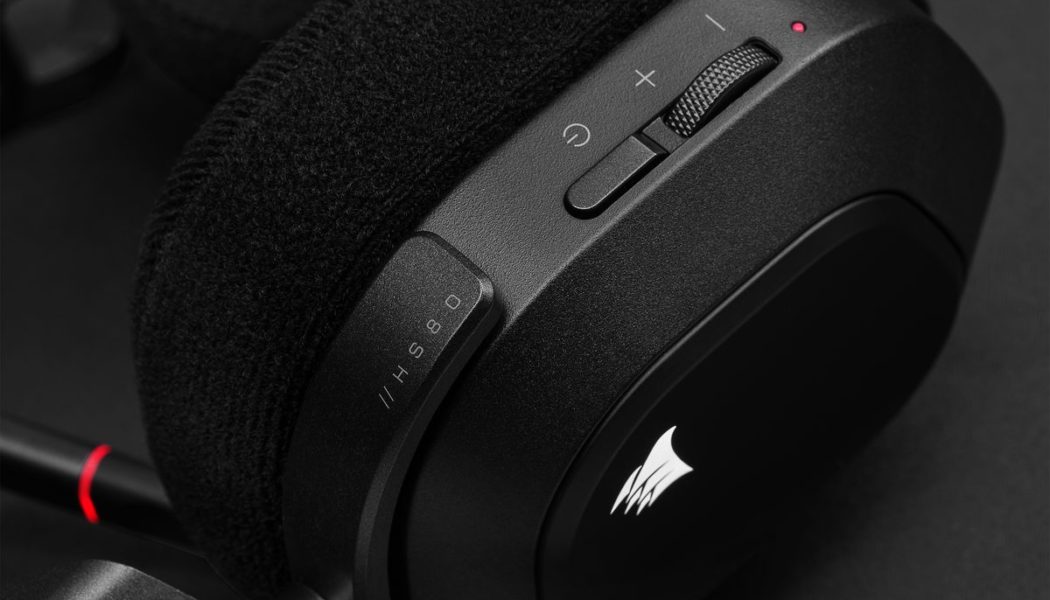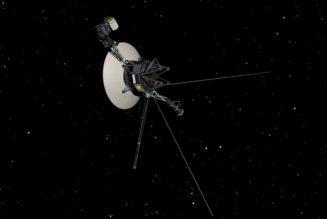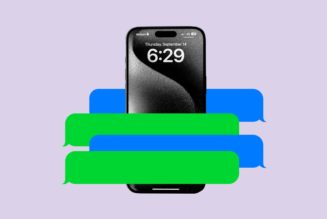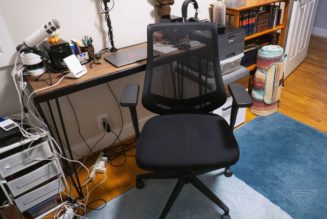Corsair impressed me last year with its $150 HS75 XB Wireless, an Xbox-exclusive wireless headset that looked and felt more like a high-end set of headphones than a gaming accessory. They also had great sound quality and an easy-to-learn button layout with the right amount of features. It wasn’t necessarily a flaw that they only worked with Xbox consoles, but no one likes to be excluded. The company has now released the HS80 RGB Wireless for the same $150 price with PlayStation compatibility, but these aren’t quite the successor that I was expecting or hoping for.
This one works with the PS4, PS5, as well as PC with its USB-A wireless transmitter. Unlike most wireless headsets that use a dongle like this, I couldn’t get it to work with my Nintendo Switch dock. Corsair says you’ll unlock higher-fidelity audio (24-bit / 90KHz) when it’s plugged directly into your PC, but it didn’t sound drastically better to me. Noticeable, yes, but not so much that I’d consider it the sole feature worth buying these for. There aren’t any PlayStation-specific features that are unlocked with this headset that I noticed, but it’s nice to have another option that works without a fuss on PS5.
Platform compatibility aside, the HS80 RGB Wireless is a departure from the HS75 XB Wireless in a few welcome and unwelcome ways. This new model’s closed-back design looks great, and it certainly remedies the HS75 XB’s issue of letting too much sound in through its open-back ear cups. But listening while in wireless mode made me realize that I preferred the benefits that the old open-back design helped to deliver, like the warmer, more inviting, and life-like sound.
:no_upscale()/cdn.vox-cdn.com/uploads/chorus_asset/file/22790060/hs80rgbwirelesscontrols.jpg)
The HS80 doesn’t sound bad, it just doesn’t have the same immediate “oh, this sounds wonderful” effect that the HS75 XB Wireless provided, despite having 50mm neodymium drivers in common. Though, again, the HS80’s sound quality seemed just a little clearer and more defined — particularly with music — while plugged into my PC, as is advertised.
The overall look riffs on Corsair’s Void lineup of headsets rather than the ovular ear cup design of the headset I’ve been comparing it to throughout this piece. The Void has generally had more of an aggressive look, but these look sophisticated. The build quality feels like a minor improvement over the HS75 XB with more aluminum touches in the mix, and I’m all for Corsair’s choice to use plush fabric ear pads over the leatherette used in the HS75 that got a little clammy at times.
One of my favorite improvements is the comfort, which received a boost by switching to a bungee-style headband that helps the headset feel light on your head. Velcro straps can be adjusted on each side of the headset underneath the headband, and it has no issues accommodating my large head. In my brief testing, the fold-up microphone made my voice sound better than I expected it to.
The HS80 RGB Wireless cans have a slew of customizable equalizer and RGB lighting settings in the iCue app for Windows 10, so unsurprisingly PC is the best platform on which to experience them. Whether you’re wired or using them wirelessly, clicking in the volume dial switches between the equalizers saved in the app on PC. But unfortunately, that very useful feature didn’t work while wirelessly connected to a console.
:no_upscale()/cdn.vox-cdn.com/uploads/chorus_asset/file/22790063/hs80rgbwirelessmic.jpg)
Coming back to performance, I tested the HS80 RGB for a while on PS5 with Final Fantasy VII: Remake and Ghost of Tsushima, constantly switching between it and Sony’s $100 Pulse 3D headset. The headset was simple to connect and get running. Though, to my surprise, I enjoyed the sound profile of the Pulse 3D more in both games. On the other hand, I preferred the comfort of the HS80 RGB.
Of course, sound quality partially comes down to taste. The sound in Sony’s headset is much more forward with its mids and highs, which puts an emphasis on its 3D audio tech. Corsair’s headset doesn’t try so hard to compete in that regard, which is fine, but overall it’s a far less exciting sound profile to listen to by comparison. I wasn’t anticipating that, given that the HS75 XB Wireless were such a joy to use.
I think there are people out there who may find all they need in a headset like HS80 RGB Wireless, expensive as it is for such a simple offering. But if you loved the HS75 XB Wireless as much as I did, you may be a little disappointed with a few of the changes here.








